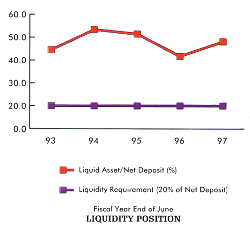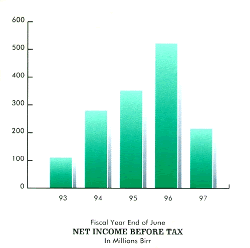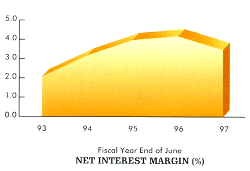There is no doubt that your bank institution is one of the leaders in the market. Could you then give our readers a brief historical background about the Commercial Bank of Ethiopia?
The history is quite a long one. It dates back to 1942, to the time when we had the state bank of Ethiopia handling both the commercial banking and the central banking. Both activities were combined. In 1963, a privately owned bank was started, and it became necessary to separate the functions of the commercial from central bank. Therefore, in 1963 the central bank of Ethiopia was divided into two. The commercial bank and the national bank were established. Since then, a number of banks have existed in this country. Among them are the Addis Bank share company that was privately owned, the Banquo di Roma share company Ethiopia, and the Banquo di Napoli Ethiopia share company. We had also a French bank called Banque de l`Indochine which is still one of our branches. However, in 1975 the socialism regime nationalized all the privately owned banks. There were also development banks, such as the investment bank and the development bank share company, which merged together to form the agricultural and industrial development bank. That bank is now renamed as the development bank of Ethiopia.

We had about 13 insurance companies which were nationalized and merged, to form the Ethiopian Insurance Corporation. At the same time, all the private banks were also nationalized and merged, to form the Addis Bank. Additionally, in July 1980 Addis bank joined the Commercial Bank of Ethiopia. Therefore, Commercial Bank of Ethiopia stands to be the merger of several banks. By virtue of that it is the biggest bank of Ethiopia that was handling the entire commercial banking sector as a monopoly bank. CBE now operates through 168 branches all over Ethiopia, including one branch in Djibouti. Its total assets is about $3,5-4 billion. Our branches are evenly distributed throughout the country, because we have criteria to open a branch. That means, we carryout feasibility study, we see the basic facilities which a bank requires such as telephone and electricity, we see the infrastructure to carry cash, and the number of businesses carried out in the town. With all these criterion put together, if we feel it is viable and the pay back period is reasonable we will establish a branch.
What is your priority in the focus for the economic development in Ethiopia. In other words, what is the role of the Commercial Bank of Ethiopia?
The role of the commercial bank of Ethiopia, by virtue of its size is enormous. The economic development started in 1991-92, when the command economy was abandoned and replaced by an open market system. Since then a number of macro policies have been revised including formulation of new economic policy, deregulation of tariffs, investment proclamations, and privatization of state owned enterprises. In the financial sector liberalization, we had the devaluation that was necessary in the import and export market. The exporter was paid fair prices and was given incentive to expand and diversify its existing business. Whereas the importer started paying realistic prices. In short, the unrealistic exchange rates had been distorting the pricing situation. The interest rate liberalization was also installed, and we had the elimination of negatively listed imports. For instance perfumes were not allowed during the previous regime. After the revision, everybody was able to import whatever they wanted. Fortunately, we had the foreign exchange auction, which was gradually reduced on weekly basis. Investors were allowed like banks to participate in their own names, so they could get a better rate. Foreign exchange retention skims were also allowed for exporters, meaning they could retain a certain amount in their own account.

The other important change we have made is decentralizing and licensing import and export transactions. Previously, these transactions were entirely the domain of the central bank; but now, each importer or exporter can go to the nearest private or government bank to be licensed. This proved to be convenient in terms of administration and time. Furthermore, we were allowed to have a bureau d`echange, and an inter-bank lending market was introduced. We formed a bankers association with all the banks, in which I am the president, and we are now in the process of registration. The existing inter bank foreign exchange is also very helpful. For instance, if our bank happens to win the major part of the foreign exchange and if another bank fails to win, our bank will provide this bank at the same price offered in our bid, that means free. This makes our business a fair play or fair ground for the banks. Otherwise, if we have big resources and buy all the foreign exchange and if we double the price while selling it to other banks they may find it difficult to compete. Eventhough, we are the only bank which mobilizes 90% of the deposits and serves 83% of the credit market , we are not happy to hold these percentages. We want the other banks to expand. Again, we have the big share of the cake, while the whole cake is also growing with the opening of new private banks. In fact with the growth of the other banks, we are still continuing to expand because there are a lot of opportunities.
Q. Are you saying that the opening of privately owned banks is not a challenge for the Commercial Bank of Ethiopia?
Absolutely, it is in fact complimentary. In the past, we were judging our performance at our own historical base by comparing different years, but actually the rule of the game has changed. Our customers are being chased. We have to be competitive in terms of pricing, in terms of qualitative services, and in terms of ability to attract customers. We want to have long range planes and strategies to tap the market and to continue our role as leaders in the market.
Your trained and skill workers might leave Commercial Bank to join the newly established banks. What will be the impact of loosing skilled manpower in your operations?
All the private banks have taken the cream of our staff. Generally, they offer them higher salary. However, we continue to remain competitive. We are remunerative, we have the opportunity to be the biggest bank, and we offer job security. The senior and middle management staff would not go for a modest salary increase, because there is a feeling of stability and the opportunity of growth is high in our highly spread branches network. For instance if one goes in a small bank, he may have the opportunity to attain two or three positions in 5 to 10 years. Whereas, in our bank there will be 400 positions waiting for him, depending on his willingness and hardworking. Commercial Bank of Ethiopia has financed investment projects of 1 billion ETB, which a lot of banks will not be in a position to do so, because of their limited resources. Our bank is also the only one involved in privatization financing.
| Are you saying that you are recently dealing with privatization?
Yes, in fact we are financing all interested privatization agencies. We require a feasibility study on the basis of denty equity ratio, depending on the merit of each case. Then, we provide the greater portion 60%-70%, whereas the investor will provide the rest.

As I mentioned it, we are the only bank involved in this kind of financing. This is due because of our size and our deposit structure; we can afford to lend immediate and long terms. Usually, the small banks are mobilizing short term funds and are concentrating only on short term credits, while the privatization requires medium and long term funds. CBE has also been financing agricultural inputs, in the order of 300-400 million birr every year. Without our assistance, fertilizers and improved seeds would not be provided. Additionally, we provide working capital in the form of term loans or overdraft seals. We involve ourselves in agriculture, construction business, import and export business, pre and post export financing, transport business, and hotel and tourism business. Shortly, we are the leaders in the market. Perhaps, next to us may be the Development Bank of Ethiopia. They are also financing industrial and agricultural projects. For some of their big projects we come in to syndicate and finance depending on their liquidity.
Which are the new financial services CBE wants to launch on the market?
The projects financing is a new area, that was launched 5 years ago, before that we were only concentrating on short term working capital requirements. We utilize also short term policies. We have about 1.4 million customers, and the great majority of them are savers, who continuously deposit in the form of long term deposits. By definition these are short term savings but in character they are long term deposits. We can afford to put a portion of these savings into project financing. The privatization financing, the agricultural input loan which previously belonged to the Development Bank of Ethiopia, and the pre and post export financing are also our financial services. Moreover, CBE has been working for the last 3 years on introducing banking information technology, which is a perquisite for introducing high- tech banking product. Once, we manage to launch it, we have in place new product projects such as ATM (automatic teller machines), smart cards, debit and credit cards. Rental services, equity participation and raising capitals will then be possible. There is a subsidiary called the commercial nominees. It's main duty is to serve the pensioners throughout the country. We may not have managed to pay everybody, but we are paying about 40 000-50 000 pensioners monthly. We clear the pension payment on behalf of the Pension Authority. We also administer wills, invest on behalf of the incapable (e.g. lack of education), administer payments to minors whose parents are deceased, and prepare prospects for different companies by advertising in local languages and float the shares.
Being the leader institution in Ethiopia, could you mention some names of foreign partners?
We have a lot of network throughout the world. For account relationships only, we have about 60-70 banks throughout the world. The major ones are Chase Manhattan Bank (US), City Bank (US), Banker Thrust (US), Lloyds Bank (UK), Commerce Bank (Germany), Dutch Bank (Germany), Banqua Commerciale Italiana (Italy), Credito Italiano Milano (Italy), Banquo Di Roma (Italy), Bank Brussels Lumberts (Belgium), Hollandish Bank (Rotterdam), Netaxis Bank (Paris), Credit Stault Bank (Vienna), Veniska Humbel Bank (Stockholm), Scandinavia and Shikilda Bank (Stockholm), United Bank of Switzerland (Switzerland), Christina Bank (Oslo), Viendanske Bank (Copenhagen), Chase Manhattan (Tokyo), Royal Bank of Canada (Canada), Kenya Commercial Bank (Nairobi), and the Bank of India (Bombay).
How confident are you in the future of Ethiopia?
I have always remained an optimist. Given the performance of the economy, the rate at which we have maintained the growth, the dynamic leadership currently installed, the enormous potential, and the ability to attract investments, I believe the growth of Ethiopia will continue at a very high rate. The banking sector will also continue to develop. The role we have to play in the economic progress is important. The remarkable thing that is recently happening is the dynamic change of the agricultural sector. The 20 units per hectare have been transformed to 100 units per hectare, because of the introduction of extension programs. Therefore the 85% of the population has made a progress, showing the country's problem have been addressed. In the investment sector also over the last few years, we had billions of birr for the implemented investments. I can conclude that the growth of the economy is very promising.
Could you give our readers, the background of your professional experience?
I graduated from the Haileselassie University in 1968, that is now called the Addis Ababa University. I then joined the Addis Ababa share company, which was a privately owned bank and assumed several positions until 1980. Afterwards, this bank was merged to the Commercial Bank of Ethiopia, and I worked as the deputy general manager of that bank. Later on, I was given the opportunity of running the international division and also promoted to work as the chief manager. Again after eight years of work, I was assigned as the deputy manager of the bank, and stayed there for about five years. Then I became the general manager for another five years. During the last three years I have been working as the president of the bank. I am also a board member at the privatization agency, at the Metehara Sugar Factory, at the Ethiopian Shipping Lines, and at the Africa export import bank in Cairo. I have also been working as an executive credit committee member in the Africa export import bank for the last seven years.
As a personal issue, what has been your most satisfying personal achievement as a president of the Commercial Bank of Ethiopia?
I have been participating actively in promoting the profitability of the bank, and it has been growing in depth and bounce. For instance, during the last six months, our profit has exceeded our target by 280 million birr. Apparently, this was due because of the growth opportunities in business, and the decentralization of import and export licensing activities. My career as a banker is to remain a professional banker. My objective is to keep the Commercial Bank growing and establish a good management skill. My success will be to develop a professional team which will carry over this bank into the future, and not to be dependent on one person for the existence of the bank.
What will be you final message to our readers?
Ethiopia is a land of opportunity, which is still unattached. We have a cheep labor force, we are people full of culture, hospitable, and our way of doing things is transparent. We will welcome any investor. I look forward to businessmen who will come here; we will work with them as bankers and financiers at the same time. |

